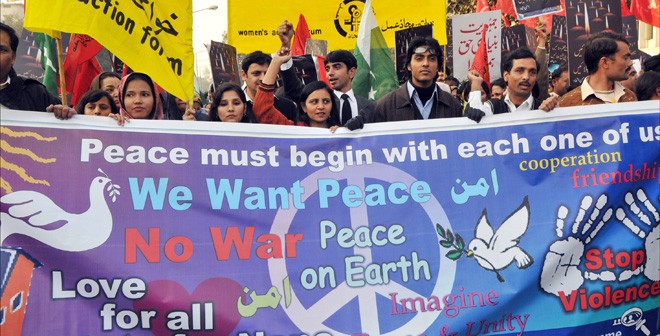

The local non-governmental organisations (NGOs) that receive foreign funds and the international non-governmental organisations (INGOs) desirous of working in Pakistan are expecting tough times ahead -- as the government braces to put them under strict scrutiny.
In a recently announced, Policy for regulation of organisations receiving foreign contributions, the Economic Coordination Committee (ECC) of the Cabinet has spelled out strict guidelines for NGOs. In case of their failure to comply, the NGOs would have to wind up and their registrations with the government would be cancelled.
The policy has been announced as an interim measure and would remain in force till the pending bill on the same subject becomes a law.
Ishaq Dar presented a private member bill titled "Regulation of Foreign Contributions Act 2013" in the Senate on March 4, 2013. He was a member of the opposition party then.
As per the policy, the NGOs receiving assistance will have to be registered with the government. Foreign assistance includes moneys, services and goods that come from outside Pakistan. The application for registration will be accompanied by documentary information as specified by the government, the ministry of interior, provincial or other relevant stakeholders such as local government.
Subject to concurrence, the government will sign an MOU with NGOs and the latter will have to provide detailed information related to their origin and work. They will also have to include information on the proposed geographical area of work that they plan to do.
Every organisation will be bound to provide information that the government may require from time to time. It may also verify the information provided by the organisation.
The rationale of coming up with the policy as given by the ruling party representatives is to check the "anti-state" activities carried out by some NGOs under the garb of social work and to ensure the funds meant for social uplift of the masses are used judiciously.
The policy is seen as a threat by the foreign-funded NGOs that believe it will harm the interests of citizens who are not served by the state. The NGOs say they mostly work in spaces left unattended by the governments.
Syed Ghulam Fatima, Secretary General, Bonded Labour Liberation Front (BLLF) says the government is trying to hold the NGOs responsible for all ills. The Shakil Afridi episode, she says, "should have been followed by the state institutions which were responsible for monitoring the string operation. But this never happened. Instead, the government is planning to stifle the development initiatives taken by local and foreign NGOs".
She questions the logic of seeking permission from the government in cases where it is responsible for violating basic rights of people itself. Citing an example, Fatima says the Punjab government announced the minimum rate of Rs 740 per 1,000 bricks for brick kiln workers but the kiln owners refused to pay this amount to their employees. The government has formed a committee which wants to reduce the minimum rate. "The BLLF is planning to raise voice against this decision," she says, adding: "We need finances for these activities. Shall we ask the government to finance these protests?"
Aftab Alam, Executive Editor, Institute for Research, Advocacy and Development says the policy can be called a diluted version of the private member’s bill proposed by Senator Ishaq Dar in March 2013. He says, "The bill, if passed in its current form, will be a draconian law. It will empower the state to manage the NGOs at micro-level."
Adnan Rehmat, Executive Director, Intermedia, calls undue control of organisations working in social sector violation of citizen’s basic constitutional right to associate and do legal business. He says, "There are around 40,000 NGOs of which 400 are highly active with turnover above $1 million. They are registered under four different categories and are required by law to file periodic reports about their activities and accounts. These NGOs do submit these reports but bureaucrats hardly seem interested."
So, why is the government eyeing each and every NGOs with suspicion? There is no harm in ensuring transparency but dictatorial control over their decision-making, working and independence is uncalled for.
Rehmat says the government is trying to monitor funds coming from a lot of organisations which partner with the state. It’s time the citizens should ask the government about the usage of these funds, but on the contrary the government is holding the social sector organisations accountable.
Ahmed Bilal Mehboob, Executive Director, Pakistan Institute for Legislative Development and Transparency says he has no objection to the part that deals with transparency but he totally rejects the idea of leaving the NGOs at the mercy of the government. The NGOs, he says, will never accept this term and will shut down their operations. It seems the government wants to make the process so tough for the NGOs that the donors start working with state to circumvent all the cumbersome procedures, he adds.
"The government abhors NGOs as they release research findings, documents, annual reports etc which expose government weaknesses or rights violations on its part. There is a strong possibility that all these activities are declared anti-state and the NGOs involved in them blacklisted and stopped from working. You never know one day they take us to task for pointing out absence of prime minister from frequent parliamentary sessions," he adds.
There are reports that a large number of NGOs in Pakistan are finalising their plans on how to react to this policy. As shared by Ghulam Fatima, the Joint Action Committee (JAC) of Lahore-based NGOs may soon start agitation against the policy. The Human Rights Commission of Pakistan (HRCP) is also holding deliberations on this development and finalising its future course of action.